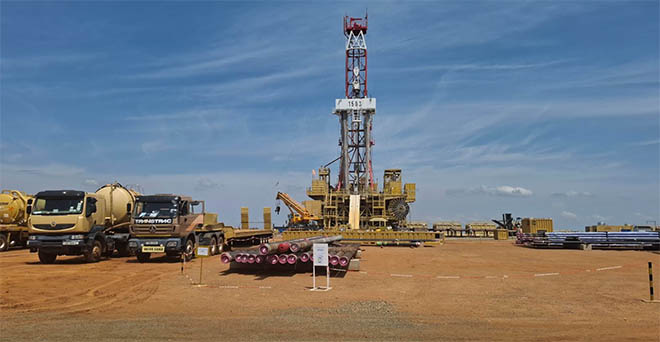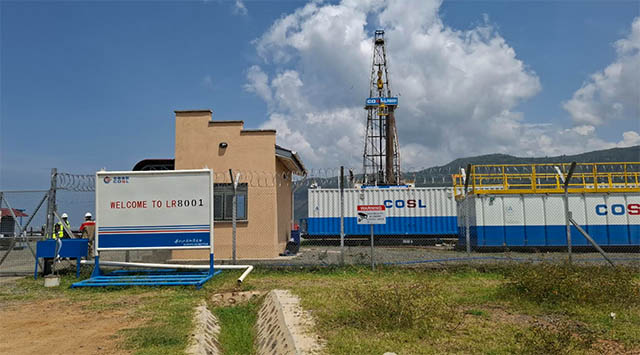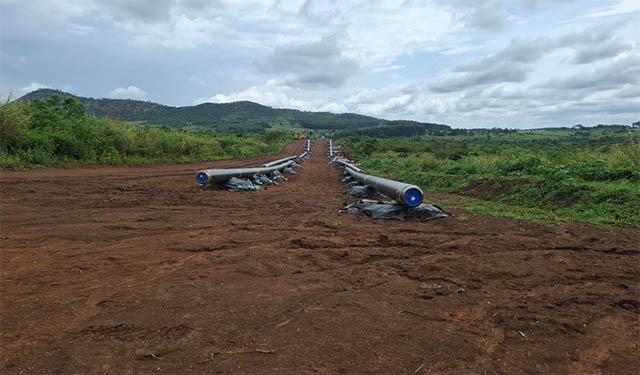
But more money still missing, says Uganda’s third EITI report
COVER STORY | RONALD MUSOKE | The value of Uganda’s mineral production has jumped from Shs 19.92 billion in 2020/2021 to Shs 202 billion in 2021/22. That is one of the findings from the country’s third report of the Extractive Industries Transparency Initiative (EITI), a global standard monitor for the good governance of oil, gas and mineral resources, based in Oslo, Norway.
The report shows that each of the 20 mining companies out of 558 active mining licence-holders for the 2021/2022 reporting period were able to remit at least Shs 6 billion to the government and accounted for 98.82% of the Shs 202 billion in mining revenues earned by the government during the reporting period.
The revenue came from taxes on production and export of minerals such as limestone, iron ore, pozzolana, wolfram, gold, kaolin, syenite, Aggregate, Volcanic Ash, Marble, Granite, and Diatomite.
The key drivers of the increment were limestone, whose value increased from Shs 223 million in 2020/2021 to Shs 93 billion in 2021/2022; iron ore which increased from Shs 4 billion to Shs 72 billion, and Pozzolana, a type of volcanic ash used for mortar or for cement that sets under water, which rose from Shs 506 million to Shs17.7 billion.
Wolfram (tungsten) did not feature amongst minerals produced in 2020/2021 but its production was valued at Shs 6.8 billion for 2021/2022. Meanwhile, gold production value also increased from Shs 1.96 billion to Shs 3.42 billion.
The latest report which was released in Kampala on Nov.28 by the Uganda EITI Secretariat contains a reconciliation of payments made by oil, gas and mining entities, and revenues received by government agencies from these entities, as well as other material payments and benefits accruing to government from the extractive sector.
Gloria Mugambe, the head of the Uganda EITI Secretariat (UGEITI) noted during the dissemination of the report that the new report saw the inclusion of more mining companies in the reconciliation scope.
She said the country’s first EITI report which was published in June 2022, saw the reconciliation of only oil and gas companies, while the second report saw the inclusion of the top eight revenue paying mining companies with a mining licence for 2020/2021. These companies included; Tororo Cement, National Cement Company-Uganda, Kampala Cement Company, Goodwill Ceramic Co. Ltd, Wagagai Mining (U) Ltd, Mota Engil and Virat Alloys. This time, 12 more companies were added onto the previous list.
Mugambe said the decision to include companies that contribute at least Shs 6 billion to government coffers; technically called the “materiality threshold” for the second and third reports was agreed by the Multi Stakeholder Group (MSG).
The MSG is a committee which comprises representatives from the government (13 members), extractive companies (7 members), and civil society organisations (5 members). The MSG oversees implementation of the EITI standard in Uganda.
“With each additional EITI report published, our intention is to build onto the existing data base in the extractive sector and to get a hand on more specific detail in terms of which companies are present in the sector; which economic activities they engage in, how much revenue they remit to the national coffers, how many Ugandans they employ and how they are improving the economic and social wellbeing of the communities where their activities are taking place,” Mugambe said.
“We get data from the relevant government institutions and in this case, they give us the information regarding which extractive companies are paying revenues in the reporting period and then we get confirmation of these numbers from the companies themselves, hence the reconciliation process.”
An incomplete picture
However, Mugambe noted that her team met a few challenges in terms of responsiveness of the companies and their ability and willingness to engage in the provision of data and the reconciliation of some of the information which is quite tedious and detailed.
“The result of that is that we do not have a complete picture from the company’s side in terms of how much money they paid during the reporting period (and) that is where the reconciliation gap came from and that is why we went ahead to publish the report with only the URA figures but (we) are still working with the companies that have not yet submitted their reconciliation figures so that we get the whole picture,” she said.

Mugambe noted that as her team went about crunching the available revenue data, they realised afterwards that whereas these companies may be paying money to URA, that revenue might actually be linked more to manufacturing than mining.
“It’s a huge debate within the MSG; the MSG institutions such as the Uganda Revenue Authority (URA), the Directorate of Geological Survey and Mines (DGSM); that when a company like Tororo Cement holds a mining licence and it is mining limestone but it also imports clinker to manufacture cement, would you call the revenue that is remitted by Tororo Cement, extractives or manufacturing revenue?”
“We still have our work cut out in terms of separating revenues and ensuring that the money we identify as extractives revenue is actually revenue that the company has earned from the sector,” she said.
Mugambe also noted how, during verification of some of the data, her team is sometimes left frustrated when it goes on the ground to verify the information.
“For instance, we have a company called Virat Alloys which holds an exploration licence for tin in Ntungamo District in western Uganda. This company paid Shs 8.3bn in 2021/2022 financial year to URA.”
“It is actually above our threshold but when we actually engaged with the company in our attempt to reconcile the figures so they comply with our reporting requirements, we found out that it is a steel company in Nalukolongo Industrial Area in Kampala,” she said. “The management said they are not a mining company but rather a steel manufacturing company. But if you are not in mining, why do you have an exploration licence and you have held it for some time.”
“You have a company like Namekara Mining Company Ltd which mines and exports vermiculite but they don’t have production figures for 2021/2022 and yet we have export figures? When DGSM inspectors go to Namekara to inspect the mines, what do they find? If they are producing, why don’t they have production figures on record?”
Mugambe said the lack of compliance by companies like Virat Alloys which categorizes itself as manufacturing company and yet it is within the threshold of mining are the ones which continue to bring about the big reconciliation gap.
However, David Sebagala, the Senior Inspector of Mines who is based at the Directorate of Geological Survey of Mines told the meeting that fluctuations in data can be attributed to either error in data but also the unpredictability of government policies on handling of minerals.
“For example, if iron ore was previously not being exported but it eventually gets exported when there is a statutory instrument to allow for the export of the iron ore, you are going to have a jump in terms of production and the taxes,” Sebagala said.
“There are instances when you are going to have steep drops when, for instance, a mineral has been traded as an ore and then the government says stop exporting the ore,” he added.
Sebagala noted that the same applies to the query on why there could be export data but no production data. He said when the government suddenly decrees that there should be no more export of some minerals, the companies involved are stuck with what they have mined.
“They will stop exports that day and they will embark on the process of solving the challenge. And when they eventually solve the problem, they will start by exporting the stockpile they had from the previous production. That is what I think happened with the Namekara vermiculite sale when the president issued a directive on export of unprocessed minerals. Vermiculite is actually processed but the ban affected them.”
Gov’t not disclosing contracts
When the Ugandan government became a member of the Extractive Industries Transparency Initiative (EITI) four years ago, citizens hoped the drive, which seeks to improve transparency and accountability of the oil, gas, and mining sector, would finally help shine a light onto a sector that, for decades, has been renowned for its opaqueness and secret deals.
Uganda joined the Extractive Industries Transparency Initiative (EITI) in August 2020, a decision which affirmed its dedication to enhancing governance in the extractive sector. As an EITI member country, each year, Uganda is required to publish an EITI report that contains details of the state of the extractive sector in the reporting period.
The EITI requires the country to disclose in detail and transparently all government money generated from the extractive sector and all significant payments made by companies in the oil and gas, and mining industries to the government.
But, it appears, those who continue to operate the levers of the sector, right from far-flung mining areas in the countryside to the boardrooms in Kampala, are not about to embrace the EITI standards and regulations, as findings from the third EITI report show.
In May this year, Uganda successfully underwent EITI validation, achieving 78.5 points under the 2019 EITI standard, an assessment which some sector players said reflected “moderate progress.”
Whereas Uganda scored well on criteria regarding outcome and impact, and stakeholder engagement, performance in the area of transparency was scored as moderate.
The poor score on the transparency index was blamed on the government not disclosing contracts it signs with oil, gas, and mining companies. The second reason was the big gaps in production and export figures for minerals, mainly gold.
The EITI Board wants the government to fix those gaps. Mark Robinson, the Executive Director of the EITI Board who visited Kampala in August advised the government that “the disclosure of contracts by all EITI member countries is a must, not an option.”
Robinson said this is according to EITI regulations passed in 2021to improve transparency and accountability in the country’s oil, gas, and mining sector.
Siragi Magara, the Extractive Industries Coordinator at Oxfam-Uganda who also doubles as a member of Uganda’s EITI Multi-Stakeholder Group said the government should know that the EITI standard runs on the Four Ds: data, disclosure, dissemination and debate.
“I am, therefore finding it a very big problem that we are still discussing the issue of disclosure as a very serious problem even when we decided to join the EITI,” Magara said. He said natural resources are ultimately owned by citizens, with the government only managing them in trust.
“It’s just fair that even if Uganda didn’t join the EITI, the government should be informing citizens about the deals it is making with their natural resources. It would be in the interest of the government to make sure that citizens know what the government is doing with their natural resources so that they can develop the confidence they need from them in order to harness peace and harmony.”
“It’s not about the contracts; no one is interested in the paper; it’s beyond paper. It’s about what exactly can be disclosed and is able to stop corruption tendencies and is able to consolidate revenue gains so that citizens are able to benefit from their natural resource wealth,” he said.
Speaking on behalf of the Energy ministry Permanent Secretary, Commissioner Frank Mugisha said the ministry considers transparency and accountability a cornerstone in the petroleum sector and is evaluating how best the disclosure of the Production Sharing Agreements can be done. He said the Attorney General on behalf of the government and the International Oil Companies all say they have no problem with the full disclosure of the agreements.

Clovice Bright Irumba who represents the Petroleum Authority of Uganda (PAU) on the EITI MSG told the meeting that a sub-committee of the MSG is in place and has been designing ways to show how Uganda is working towards full disclosure.
“Our work involved understanding the dynamics of contracts. We agreed to meet industry and that meeting was led by the Chairperson of the MSG and in that meeting, we actually got the agreement in principle; that the industry would not mind sharing those agreements. The next level was to go back to the higher levels to meet people with the Permanent Secretary, Ministry of Energy; the Executive Directors of government agencies and that was done.”
“It then became clear that we needed to bring the matter to the Minister of Energy and the Attorney General and there was also a suggestion that we needed to present a paper to Cabinet although we were divided as to whether that was necessary considering the fact that Cabinet already approved the country to join the EITI.”
But Irumba told the meeting that when they undertook some benchmarking of countries that subscribe to EITI, they found most do not disclose contracts. “Although I don’t want to say that their behaviour is going to influence Uganda, we found that most countries actually don’t disclose; you don’t find their contracts on any website,” Irumba said.
Saul Ongaria, the Coordinator of the EITI in Uganda, said steps have been taken to engage the companies and most of them have declared that they want transparency. So, it is now upon the government to come to a decision.
“Looking at these contracts deeply creates an opportunity for us to identify gaps that might exist, where leakages are in terms of revenue, and where opportunities for corruption exist. I think this is something we should appreciate as institutions of government; that transparency and accountability actually works to our advantage.”
Ongaria said claims that disclosed signed contracts put the government at a disadvantage in negotiations with new prospective investors cannot ignore demands by international and multi-lateral lending organizations for transparency and accountability even within the contracts that are already negotiated.
Revenue mobilisation target off
Moses Kaggwa, the Director Economic Affairs in the Ministry of Finance as well as the Chairperson of the MSG in Uganda said the third EITI report represents a milestone in Uganda’s ongoing journey to ensure that the wealth of the country’s natural resources translates into sustainable and shared prosperity for all Ugandans.
Kaggwa noted that since joining the EITI, Uganda has consistently produced the EITI report. “This has shown the level of commitment and dedication that we attach to the principles of transparency and accountability,” he said.
“We need to strengthen our systems to combat corruption, streamline revenue management and build the capacity of our institutions and communities to monitor resource use effectively.” he added.
Kaggwa said the extractives sector is very important to Uganda’s economic development vision which seeks to grow the economy from its current US$53bn to US$500bn in 15 years’ time.
“This vision demands not only accountability but also innovation, investments in human capital and partnerships that can prioritise environmental sustainability and social equity,” he said.
Speaking from the EITI Secretariat in Oslo, Edwin Wuardom Warden who supports Anglophone countries to implement the EITI standard said the Uganda government will not meet its domestic revenue mobilisation target of 16% of tax to GDP ratio from the curret 13% unless revenue leakages in the extractives sector are plugged.
“The country’s extractives sector remains one of the most vulnerable sectors where revenue leakages are happening,” he said, “This is an area that affects government coffers and minimizes the opportunities of realising some of the well-thought out government priorities,” he said.
 The Independent Uganda: You get the Truth we Pay the Price
The Independent Uganda: You get the Truth we Pay the Price


